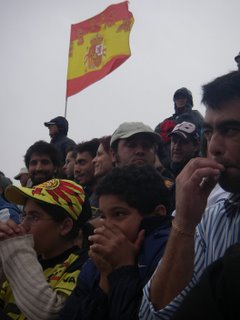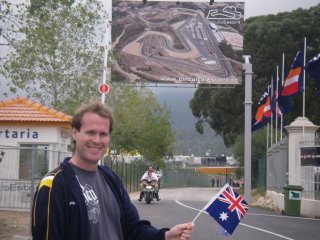Practise the following and repeat often with plenty of "yeeeeeeeaaaaaaah"s:
- "Como que e *insert name of town here* ?!"
- "Todas as gentes, y'all"
- "Mesmo sim, mesmo sim"
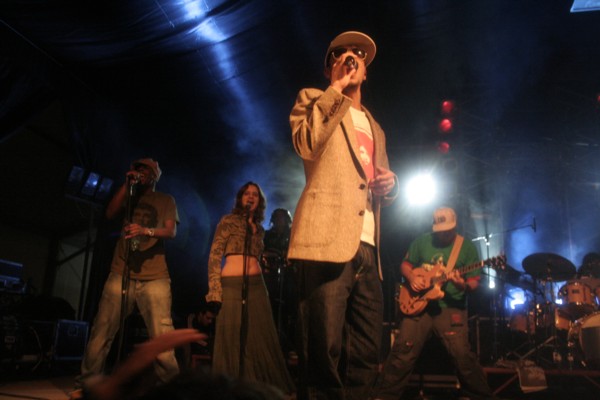
Not the usual Monday night on a school week but we headed out to see one of Portugal's hippest and hottest bands. But even a gig can involve a gastronomic experience and since the gig was at the Borba Wine Fair food and wine was definitely involved. One of the dual marquees set up for the fair was filled with temporary restaurants, with the local restaurateurs keen to show off their wares despite the make-shifts facilities and stall after stall of cakes, pastries, sausages, jams and cheeses. And this is before we got to the wine stands.
Whenever I go to fairs/festas here I end up comparing them to the country shows back home. One reason is they have the same role in the community, and in a lot of ways the towns here are just as isolated as some towns in Australia. One difference - instead of being able to taste every wine at each stand you have to ask to taste or show some interest, plus its generally accepted that if you taste one you'll buy it. Not necessarily a problem when the wine is as good as it is (Borba being one of the wine capitals of Portugal) but it is a lot better for the tight-arses at an Aussie wine show.
And to the band, finally and drunkenly (can I just mention cherry liquer in a chocolate cup before we get to the band? Thank you!). Expensive Soul are one of Portugal's hottest hip-hop/funk/soul bands and have already had a song on MTV plus one of the local soaps. They were good actually - live instruments, lyrics and rappers about respect and having fun not gang-banging - and settled into a groove despite the crowd probably having eaten too much to really jump around. Even the parents and the old men moved out from the bar to see what all the kids were listening to. This made it easier for the kids to sneak some drinks in but they know their booze in Borba - the 16 year old I saw had a bottle of local port hidden in his hoodie.
At encore the band wandered back on stage and announced that "this is now our party", bottle in hand in true rock star fashion. But being Borba the bottle was red wine. Another part of the party was inviting everyone up on stage - meaning every 10 year old tired of jumping around in the dark could now jump around and pull faces at their friends in the spotlights. Again I thought back to Australia - no country show I went to ever had an original band, let alone one which had had airplay or a national profile. And certainly there was no chance of kids getting to live out a dream by jumping on stage and pretending to be a star.

Photos by JB
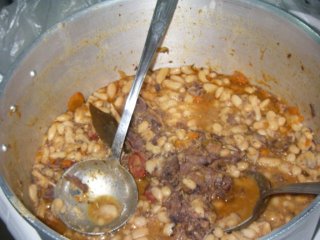 *animal not named to protect identity. And so you don't get too horrified what I'm eating. Animals were harmed in the making of this blog post. But I didn't know until they were served to me on a plate. Sorry.
*animal not named to protect identity. And so you don't get too horrified what I'm eating. Animals were harmed in the making of this blog post. But I didn't know until they were served to me on a plate. Sorry.

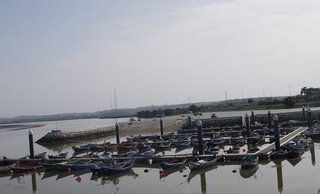
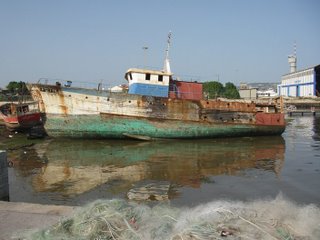
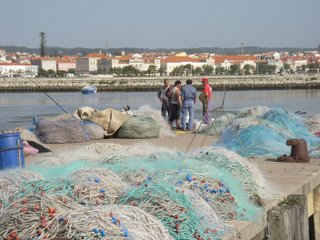
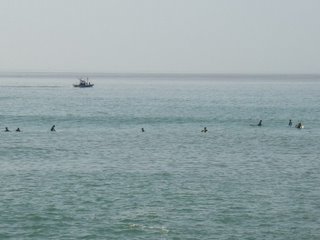
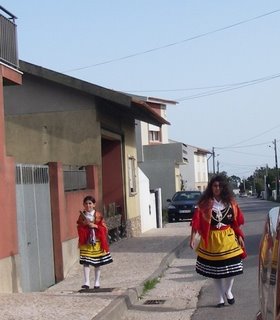
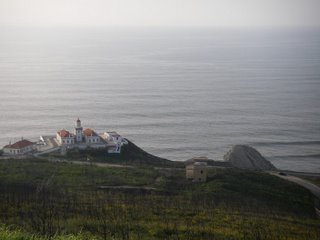
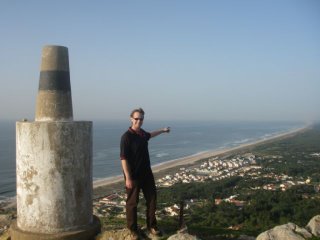
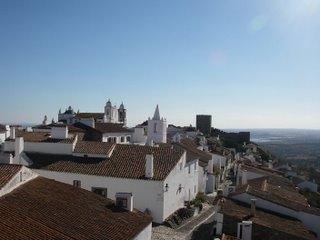
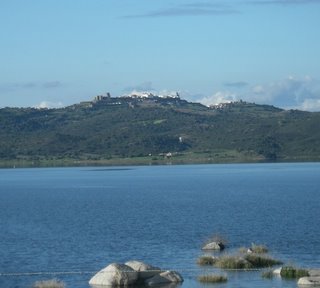
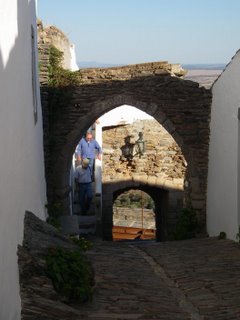


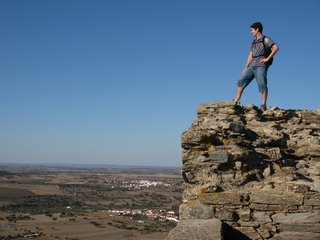
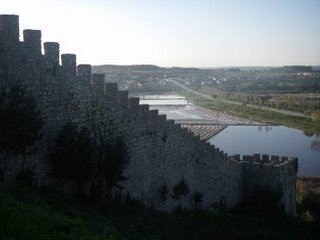
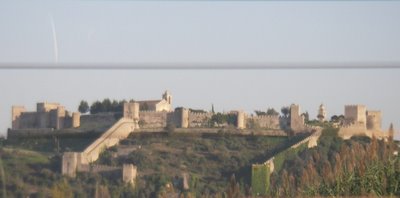
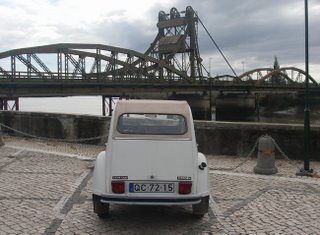 I've blogged about Alcacer do Sal briefly
I've blogged about Alcacer do Sal briefly 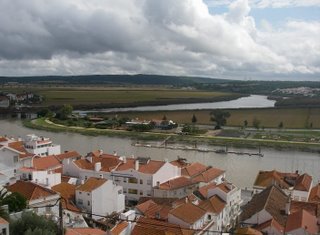 If one photograph can sum up a country this is it. Portugal in a picture: washing outside the windows, wrought iron balconies, tiled exterior, in the background the belltowers of a church and (harder to see) centre right in the shade the shield of the town on the corner of the building, below it a Delta coffee sign outside a ground floor cafe.
If one photograph can sum up a country this is it. Portugal in a picture: washing outside the windows, wrought iron balconies, tiled exterior, in the background the belltowers of a church and (harder to see) centre right in the shade the shield of the town on the corner of the building, below it a Delta coffee sign outside a ground floor cafe.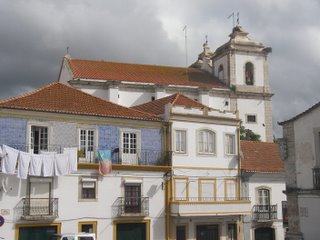 Another slice of normal life: When you visit Alcacer you will inevitably stop for a coffee on the street/esplanade next to the river, if not a few beers as the sun sinks into a cool evening, and more than likely you'll take a walk along the riverside. As you walk watch out for these old ladies hawking little shrimps from the estuary (fresh? who knows) to passers-by, in-between catching up on town gossip.
Another slice of normal life: When you visit Alcacer you will inevitably stop for a coffee on the street/esplanade next to the river, if not a few beers as the sun sinks into a cool evening, and more than likely you'll take a walk along the riverside. As you walk watch out for these old ladies hawking little shrimps from the estuary (fresh? who knows) to passers-by, in-between catching up on town gossip. 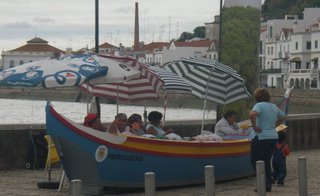 This is the town from the other side of the river crossed by the pedestrian bridge on the left reminiscent of London's Millenium Bridge. The town hall and town square is typical Manueline while the castle on the hill is 5000 years old. The main part of the castle has been restored using new style crappy cement and converted into a hotel/pousada so is more photogenic from a distance, the belltower remains authentic but is surrounded by power lines and full of graffiti from the locals who seem to have tagged it as a hangout.
This is the town from the other side of the river crossed by the pedestrian bridge on the left reminiscent of London's Millenium Bridge. The town hall and town square is typical Manueline while the castle on the hill is 5000 years old. The main part of the castle has been restored using new style crappy cement and converted into a hotel/pousada so is more photogenic from a distance, the belltower remains authentic but is surrounded by power lines and full of graffiti from the locals who seem to have tagged it as a hangout. 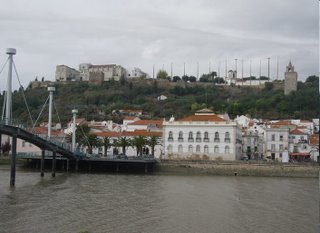 The church you can see between them would've been behind the old town walls and is a 12th Century church with a Romanesque arch (unusual in Portugal). The interior contains the graves of the local noblility, and records of visits by the royal family since the Dukes of Alcacer were cousins to the royal line and fairly important during this time. It also contains a lot of gold!
The church you can see between them would've been behind the old town walls and is a 12th Century church with a Romanesque arch (unusual in Portugal). The interior contains the graves of the local noblility, and records of visits by the royal family since the Dukes of Alcacer were cousins to the royal line and fairly important during this time. It also contains a lot of gold! 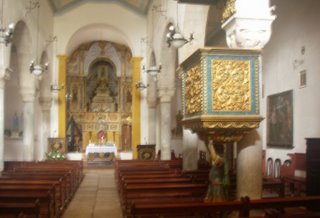
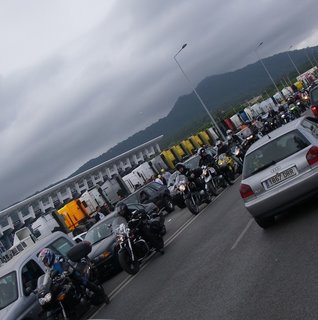 We stood in line until tickets sold out then spent a couple of hours standing at the gate watching keenly for scalpers or people with extras. One of the advantages of people visiting is that I learn to apply Portuguese in different situations so I can now beg, haggle and scalp tickets :) After a complicated deal involving buying two grandstand tickets then onselling a standing room ticket (all at face price so no actual scalping - bizarre!) we were in!
We stood in line until tickets sold out then spent a couple of hours standing at the gate watching keenly for scalpers or people with extras. One of the advantages of people visiting is that I learn to apply Portuguese in different situations so I can now beg, haggle and scalp tickets :) After a complicated deal involving buying two grandstand tickets then onselling a standing room ticket (all at face price so no actual scalping - bizarre!) we were in!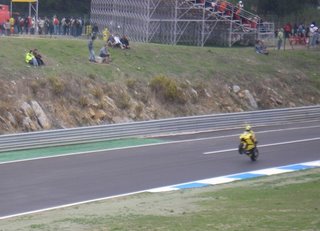 Not that a grandstand ticket gets you a seat - I don't think anyone has heard of overcrowding so the only room was on the grandstand stairs packed in amongst all the Spanish that had ridden across the Iberian peninsula for the day.
Not that a grandstand ticket gets you a seat - I don't think anyone has heard of overcrowding so the only room was on the grandstand stairs packed in amongst all the Spanish that had ridden across the Iberian peninsula for the day.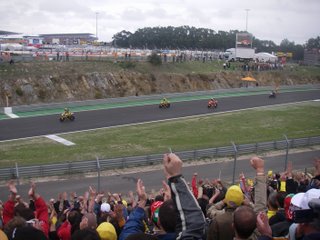 I've always thought motorbike riders/enthusiasts were a close-knit, passionate breed but the intensity of feeling here surprised me. One guy next to me practically sulked when his favourite rider crashed out. I tried to mimic the same emotion when the lone Aussie crashed out but just couldn't match his passion. Or that of the young Valentino Rossi fans below anxiously hoping he can regain front position towards the end of the race.
I've always thought motorbike riders/enthusiasts were a close-knit, passionate breed but the intensity of feeling here surprised me. One guy next to me practically sulked when his favourite rider crashed out. I tried to mimic the same emotion when the lone Aussie crashed out but just couldn't match his passion. Or that of the young Valentino Rossi fans below anxiously hoping he can regain front position towards the end of the race.